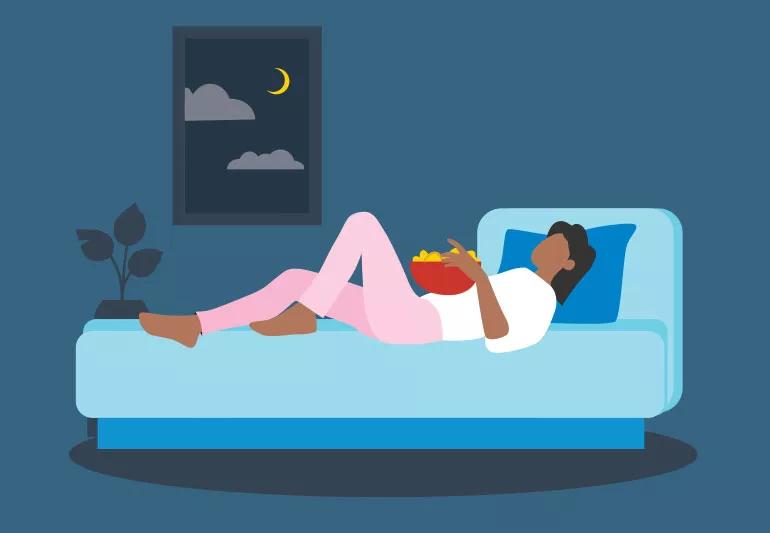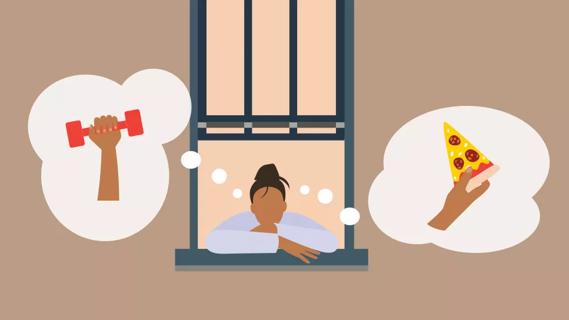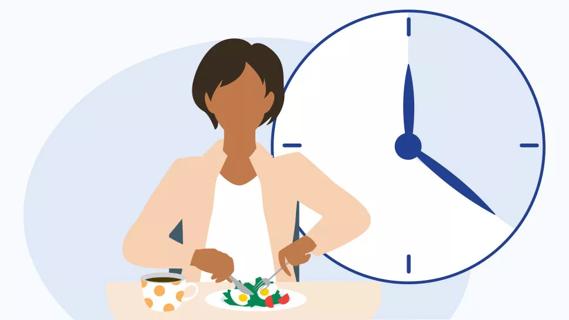The best approach to late-night snacking

Whether it’s a late-night meal or a midnight snack, chances are you’ve heard a lot of tips and advice about whether or not it’s OK to eat before going to bed. From messing with your metabolism to maintaining blood sugar levels, there’s a wide range of thought.
Advertisement
Cleveland Clinic is a non-profit academic medical center. Advertising on our site helps support our mission. We do not endorse non-Cleveland Clinic products or services. Policy
The truth is, you should avoid eating before bed, says registered dietitian Alexis Supan, RD. But, she adds, that’s not always realistic. Supan outlines the good and the bad about eating before bed and what’s OK to eat if you have to.
No, you shouldn’t eat before bed, says Supan, and one reason is because of the way your body functions. “When you eat late at night, you’re going against your body’s circadian rhythm,” she says.
It’s all about the way your body adjusts its insulin sensitivity. Your body is more sensitive in the morning on purpose. “That’s to help fuel our bodies, get us moving and get us through the day,” explains Supan. “But our insulin resistance kicks up at night.” The result is that those extra calories coming from your late-night meal or snack are stored as fat while you sleep instead of being burned throughout the day.
Another reason that eating late is bad is because that’s when we tend to make less healthy decisions about what we consume. “At night is when we eat the unhealthy stuff — chips, cookies, ice cream — as part of our nighttime relaxation routine. But it’s also mindless eating,” says Supan.
Again, the best-case scenario is that you don’t eat anything before bed. But that’s also not always realistic. Maybe work keeps you up late or your eating schedule gets thrown off and you need, well, something.
Advertisement
“If you’re really hungry, steamed or raw vegetables is the best way to go,” says Supan. But if you’re in the need of something sweet, there are options that won’t do too much damage:
These options provide your body with protein and some healthy fat while also helping you feel full.
Just as important as what you eat before bed, though, is how much you eat, says Supan. “It’s really important to think about portions,” she notes. “When we get in a lot of trouble is when we’re just mindlessly eating out of a big container while watching TV or playing video games. It’s almost like having an infinite supply, which is dangerous.”
So, even if you break down and go for something sweeter, keep it to one or two cookies, not a whole sleeve or package.
If you want a good night’s sleep, skip everything high in fat and sugar like that candy bar or bowl of ice cream. And you need to be especially careful about two other things:
Again, it’s about keeping your body as healthy as possible before bed to keep it from storing those excess calories as fat.
It’s best to stop eating about three hours before going to bed. That allows plenty of time for your body to digest the last food you ate so it won’t disrupt your sleep, but leaves a small enough window before sleep that you won’t go to bed feeling hungry. It also gives people with acid reflux time to avoid symptoms before bed.
Eating your last meal too early is also a concern, though, says Supan: “If you’re going to bed hungry, that can also be disruptive to your sleep which can have some negative effects.”
But for people who are early diners but late to bed, a late evening snack — a healthy one like the suggestions above — might be a good idea to avoid that disruptive hunger. “That late evening snack, as long as it’s healthy, could even be beneficial to helping you sleep better in those circumstances.”
As for a specific time, Supan says it really depends on your day. Whether you eat earlier in the day, so your last meal is at 7 p.m., or you’re more of a night owl, so you’re last meal is at 9 p.m. or later, it’s that three-hour window that’s most important.
Keeping a three-hour window helps ensure a less disruptive sleep and a healthier body when you wake and get ready to face the day.
Advertisement
Learn more about our editorial process.
Advertisement

With a focus on internal cues for hunger and fullness, this eating style may revolutionize your relationship with food

Review the ingredients, watch for sugar and fat, and choose one with the right amount of protein for your needs

Getting the hang of portions can help you better understand how much to put on your plate

A typical recommended balanced diet is half fruits and veggies, a quarter protein and a quarter grains

Foods high in protein, fiber and water can help keep hunger at bay

This quirky food trend is harmless, as long as you’re getting enough protein, fiber and healthy fats

Learning about your relationship with food can help improve your eating behaviors and patterns

Eating mindfully, sipping water and chewing slowly can help your brain catch up with your stomach

Wearing a scarf, adjusting your outdoor activities and following your asthma treatment plan can help limit breathing problems

Your diet in the weeks, days and hours ahead of your race can power you to the finish line

When someone guilt trips you, they’re using emotionally manipulative behavior to try to get you to act a certain way